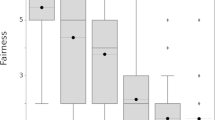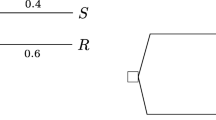Abstract
Fehr and Schmidt (FS) introduced an influential social utility function for individuals in interpersonal contexts that captures self-centered inequity aversion. The value of this social utility function lies in its exceptionally good balance between parsimony and fit. This paper provides a preference foundation for exactly the model of FS with preference conditions that exactly capture the exceptionally good balance of FS. Remarkably, FS is a special case of Schmeidler’s rank-dependent utility for decision under uncertainty.
Article PDF
Similar content being viewed by others
Avoid common mistakes on your manuscript.
References
Aczél J (1966) Lectures on functional equations and their applications. Academic Press, New York
Artzner P, Delbaen F, Eber J-M, Heath D (1999) Coherent measures of risk. Math Finance 9: 203–228
Ben Porath E, Gilboa I (1994) Linear measures, the gini index, and the income-equality trade-off. J Econ Theory 64: 443–467
De Waegenaere A, Wakker PP (2001) Nonmonotonic Choquet integrals. J Math Econ 36: 45–60
Fehr E, Schmidt KM (1999) A theory of fairness, competition and cooperation. Q J Econ 114: 817–868
Gilboa I (1987) Expected utility with purely subjective non-additive probabilities. J Math Econ 16: 65–88
Gilboa I, Schmeidler D (1989) Maxmin expected utility with a non-unique prior. J Math Econ 18: 141–153
Harsanyi JC (1955) Cardinal welfare, individualistic ethics, and interpersonal comparisons of utility. J Polit Econ 63: 309–321
Kahneman D, Tversky A (1979) Prospect theory: an analysis of decision under risk. Econometrica 47: 263–291
Koopmans TC (1960) Stationary ordinal utility and impatience. Econometrica 28: 287–309
Neilson WS (2006) Axiomatic reference-dependence in behavior toward others and toward risk. Econ Theory 28: 681–692
Rablen MD (2008) Relativity, rank, and the utility of income. Econ J 118: 801–821
Sandbu ME (2008) Axiomatic foundations for fairness-motivated preferences. Soc Choice Welf 31: 589–619
Savage LJ (1954) The foundations of statistics. Wiley, New York
Schmeidler D (1986) Integral representation without additivity. In: Proceedings of the American mathematical society, 97, pp 255–261
Schmeidler D (1989) Subjective probability and expected utility without additivity. Econometrica 57: 571–587
Tversky A, Kahneman D (1992) Advances in prospect theory: cumulative representation of uncertainty. J Risk Uncertain 5: 297–323
von Neumann J, Morgenstern O (1944) Theory of games and economic behavior. Princeton University Press, Princeton
Wakker PP, Tversky A (1993) An Axiomatization of Cumulative Prospect Theory. J Risk Uncertain 7: 147–176
Open Access
This article is distributed under the terms of the Creative Commons Attribution Noncommercial License which permits any noncommercial use, distribution, and reproduction in any medium, provided the original author(s) and source are credited.
Author information
Authors and Affiliations
Corresponding author
Additional information
The author would like to thank Marc Fleurbaey, Itzhak Gilboa, Ingrid M. T. Rohde, Klaus M. Schmidt, Peter P. Wakker and two anonymous referees for helpful comments and suggestions. Kirsten Rohde’s research was made possible through a VENI grant from the Netherlands Organization for Scientific Research (NWO).
Rights and permissions
Open Access This is an open access article distributed under the terms of the Creative Commons Attribution Noncommercial License (https://creativecommons.org/licenses/by-nc/2.0), which permits any noncommercial use, distribution, and reproduction in any medium, provided the original author(s) and source are credited.
About this article
Cite this article
Rohde, K.I.M. A preference foundation for Fehr and Schmidt’s model of inequity aversion. Soc Choice Welf 34, 537–547 (2010). https://doi.org/10.1007/s00355-009-0413-5
Received:
Accepted:
Published:
Issue Date:
DOI: https://doi.org/10.1007/s00355-009-0413-5




